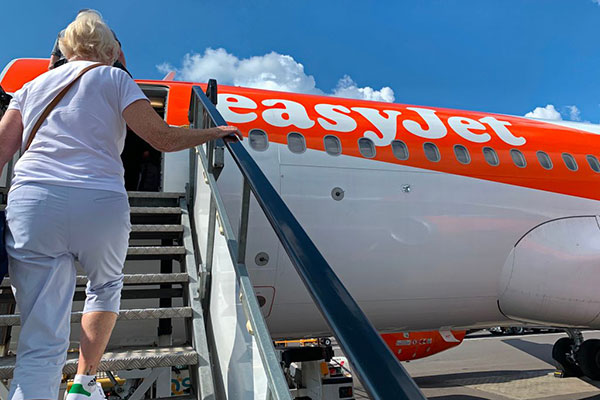easyJet: beginning to emerge from the clouds
29th November 2022 08:53
by Richard Hunter from interactive investor
Given a year of challenges, the FTSE 250 company has made some clear progress, says our head of markets Richard Hunter.

Freed from the holding pattern restrictions of the pandemic, easyJet (LSE:EZJ) is beginning to emerge from the clouds.
The latest quarter in particular is one from which the company will take much comfort, with record earnings accompanied by a load factor of 93% which augur well for the immediate future. The outlook is also relatively upbeat, with revenue per seat for next year expected to increase by more than 20%, Easter bookings showing promise and plans already in place to be prepared for the 2023 summer season.
- Find out about: Transferring a Stocks & Shares ISA | Share prices today | Top UK shares
That preparation is important, as evidenced by the issues airlines faced earlier this year as operational capacity was tested to the full as passenger demand recovered at a pace which some could not handle. Nor does the list of headwinds end there, with a question mark over the consumer’s desire to take short-haul breaks amid a cost of living crisis, a volatile oil price, wage inflation and the strength of the US dollar all impacting on the immediate outlook.
Set against a year of challenges, which has included the outbreak of the Omicron variant and the conflict between Russia and Ukraine, easyJet has made some clear progress.
At the headline level, an adjusted pre-tax loss of £178 million compares with one of £1.1 billion the year previous. Total revenue rose significantly to £5.8 billion from £1.5 billion, with revenue per seat spiking by 31%. Passenger numbers increased by 242%, although the increased activity inevitably had an impact on costs, which rose by 129% to just under £6 billion, mostly due to the increase in flown capacity.
Even so, the group is seeing the benefits of a strategy which seems primed to benefit from the current environment. On the one hand, it targets slots in airports on which it can gain the highest returns, while also providing an experience which is relatively light on the consumer budget. At the same time, its focus on ancillary revenues such as personally allocated seats, baggage and food is also boosting revenues to the tune of being up by 59% as compared to pre-pandemic levels. Its previous foray into widening the travel experience by launching easyJet Holidays is also beginning to attract the attention of a conservative consumer, with a pre-tax profit contribution of £38 million representing progress indeed.
The increased revenues have also enabled the further reduction of net debt, which now stands at £700 million from a previous £900 million, with sufficient cash in the background bolstered by a previous rights issue. It may be too early for easyJet to consider reintroducing a dividend, which seems prudent until such time as a firm recovery path can be established.
For all its progress, the list of headwinds past, present and yet to come have weighed heavily on a share price which stood at around £13 pre-pandemic and now languishes somewhere around £4. Over the last year, and despite some more recent strength, the shares have lost 21%, as compared to a decline of 15% for the wider FTSE 250 index. However, a potentially new direction of travel is at last emerging and although airlines remain at the higher end of the risk scale as they have always historically done, the market consensus of the shares as a buy reflects growing optimism for the company’s prospects over the longer term.
These articles are provided for information purposes only. Occasionally, an opinion about whether to buy or sell a specific investment may be provided by third parties. The content is not intended to be a personal recommendation to buy or sell any financial instrument or product, or to adopt any investment strategy as it is not provided based on an assessment of your investing knowledge and experience, your financial situation or your investment objectives. The value of your investments, and the income derived from them, may go down as well as up. You may not get back all the money that you invest. The investments referred to in this article may not be suitable for all investors, and if in doubt, an investor should seek advice from a qualified investment adviser.
Full performance can be found on the company or index summary page on the interactive investor website. Simply click on the company's or index name highlighted in the article.